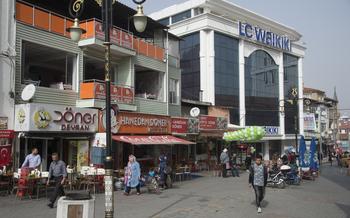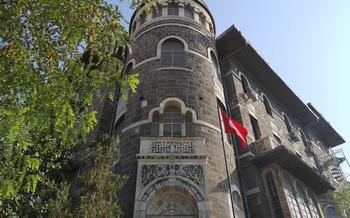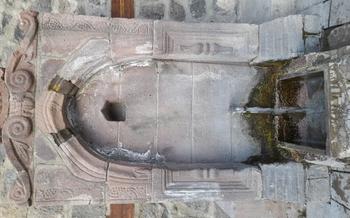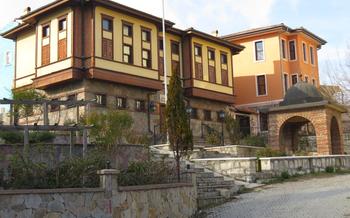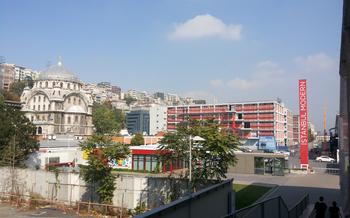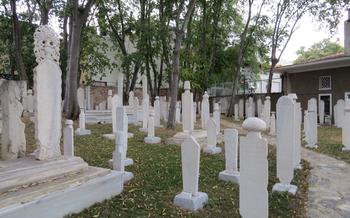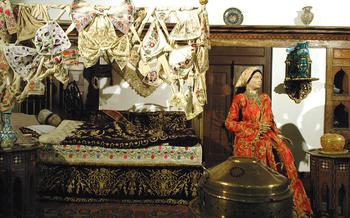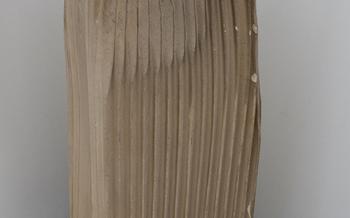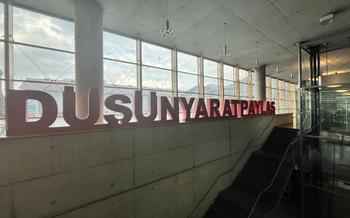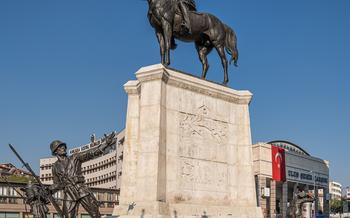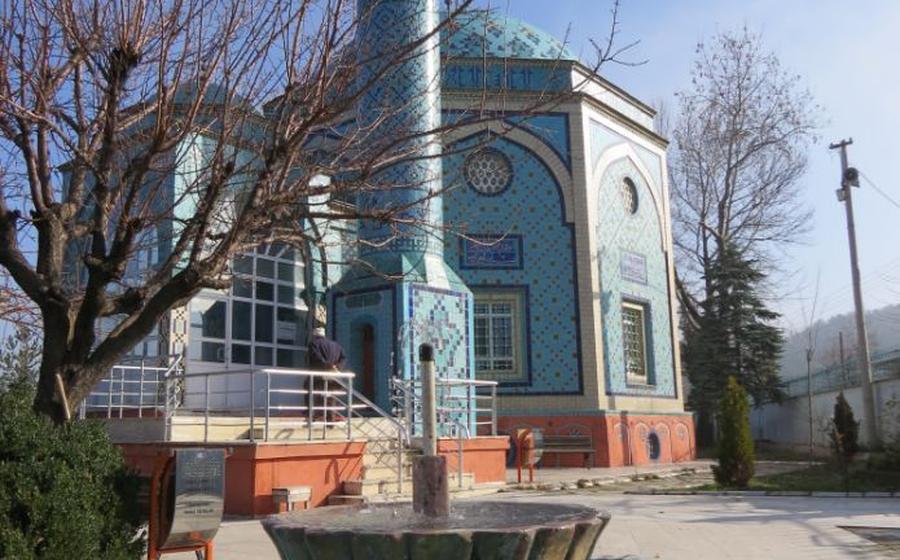
Museum of Free Horses Karik Museum
- History of the Museum of Free Horses Karik Museum
- Location
- Architecture
- Collections
- Exhibitions
- Guided Tours
- Educational Programs
- Research Center
- Museum Shop
- Café
- Accessibility
- Hours of Operation
- Admission Fees:
- Insider Tip:
History of the Museum of Free Horses Karik Museum
The Museum of Free Horses Karik Museum in Kütahya, Turkey, is a unique institution dedicated to preserving and celebrating the rich history and cultural significance of horses in Turkish society. Founded in 2004 by renowned horse artist and sculptor Mehmet Ali Karik, the museum houses an extraordinary collection of horse-themed artwork and artifacts that tell the story of the deep bond between humans and horses throughout history.
The museum's establishment was inspired by Karik's lifelong passion for horses and his desire to create a space where people could learn about and appreciate the beauty, grace, and strength of these magnificent animals. The museum serves as a tribute to the integral role that horses have played in Turkish culture, from their use in warfare and transportation to their symbolic representation in art, literature, and folklore.
Location
The Museum of Free Horses Karik Museum is nestled in the heart of Kütahya, a city steeped in history and cultural heritage. It is situated on Atatürk Boulevard, a prominent thoroughfare in the city, making it easily accessible for visitors. The museum is housed in a stunning building that blends traditional and modern architectural elements, creating a striking visual presence that draws the attention of passersby.
To reach the museum using public transportation, visitors can take a short bus ride or a scenic walk from the city center. The museum is well-connected to the public transportation network, with several bus stops located within walking distance. Once you arrive at the museum, you will find yourself surrounded by a vibrant neighborhood filled with charming cafes, traditional restaurants, and local shops, offering a delightful blend of history and modern amenities.
In the vicinity of the museum, visitors can explore a wealth of cultural and historical attractions. The iconic Kütahya Castle, with its imposing ramparts and panoramic views, is just a short walk away. The city is also home to several other museums, art galleries, and historical sites, making it a perfect destination for those seeking a journey through time and culture.
Architecture
The Museum of Free Horses Karik Museum stands out for its unique architectural design that harmonizes with the natural beauty of its surroundings. The building seamlessly blends contemporary elements with traditional Turkish motifs, creating a captivating fusion of old and new. Visitors are greeted by a striking façade that incorporates large glass panels, allowing natural light to flood the interior spaces. The spacious layout features open areas and interconnected galleries, encouraging a fluid flow of movement through the museum. The use of natural materials, such as wood and stone, adds warmth and authenticity to the overall ambiance. The museum's architects have skillfully integrated traditional Turkish elements into the design, such as intricate tile work and arched doorways, paying homage to the country's rich cultural heritage. The Museum of Free Horses Karik Museum is a testament to the power of innovative architecture in creating a space that is both aesthetically pleasing and conducive to contemplation and appreciation of horse-related art.
Collections
The Museum of Free Horses Karik Museum houses a diverse range of horse-related exhibits that showcase the deep connection between horses and Turkish culture. The collection includes a vast array of paintings, sculptures, photographs, and other art forms, all centered around the theme of horses. These artworks capture the beauty, grace, and spirit of horses in various styles and techniques, offering visitors a unique perspective on equine artistry.
In addition to the artworks, the museum also displays historical artifacts and documents related to horses. These items provide insight into the significance of horses in Turkish history, from their role in warfare and transportation to their use in sports and leisure activities. Visitors can learn about the different breeds of horses found in Turkey and their importance to the country's equestrian traditions.
The museum's collection is not limited to traditional art forms. It also features contemporary works that explore the relationship between horses and humans in modern society. These pieces often challenge traditional notions of horse ownership and use, encouraging visitors to think critically about the role of horses in our world.
Overall, the Museum of Free Horses Karik Museum offers a comprehensive and captivating collection that celebrates the unique bond between horses and humans. Whether you are an art enthusiast, a horse lover, or simply curious about Turkish culture, you are sure to find something to appreciate in this remarkable museum.
Exhibitions
The Museum of Free Horses Karik Museum showcases a diverse range of horse-related exhibitions, both temporary and permanent. These exhibitions provide a platform for artists, photographers, and historians to share their unique perspectives on the horse and its significance in Turkish culture.
Temporary exhibitions often feature the works of renowned artists from around the world, showcasing a variety of artistic styles and mediums. These exhibitions provide a fresh and dynamic perspective on the horse, allowing visitors to appreciate the diverse interpretations of this magnificent animal.
Permanent exhibitions, on the other hand, delve deeper into the history and cultural significance of horses in Turkey. Visitors can explore the evolution of horse breeds, learn about the role of horses in warfare, and witness the intricate craftsmanship of traditional horse tack and saddles.
Interactive displays and educational programs further enhance the visitor experience. Touchscreen kiosks, multimedia presentations, and hands-on activities provide an engaging and informative way to learn about horses and their relationship with humans.
The museum also organizes special events and workshops throughout the year, such as equine art exhibitions, lectures by renowned experts, and family-friendly workshops on horse-related crafts. These events provide an opportunity for visitors to connect with fellow horse enthusiasts, learn new skills, and gain a deeper appreciation for the world of horses.
Guided Tours
The Museum of Free Horses Karik Museum offers guided tours in multiple languages to enhance the visitor experience. These tours provide a deeper insight into the museum's collection and the significance of horses in Turkish culture. Knowledgeable guides lead the tours, sharing fascinating stories and anecdotes about the artworks and historical artifacts on display.
Thematic tours are also available, catering to specific interests and focusing on particular aspects of the collection. Visitors can choose from tours that explore the history of horse breeds, the evolution of horse art, or the role of horses in warfare and transportation. These specialized tours offer a tailored experience for those seeking in-depth knowledge and appreciation of horse-related subjects.
Advance booking for guided tours is recommended, especially for larger groups, to ensure availability and a personalized experience. Group discounts are also available for organized visits, making it an affordable and enriching option for schools, organizations, and tour groups.
Educational Programs
The Museum of Free Horses Karik Museum is not just a place to admire equestrian art but also a hub for education and learning. It offers a variety of educational programs designed to engage visitors of all ages and deepen their understanding of horses and horse-related topics.
Workshops, Seminars, and Lectures:
The museum regularly hosts workshops, seminars, and lectures conducted by experts in the field of equine studies. These programs cover a wide range of topics, from horse anatomy and behavior to horse care and training. Participants can learn from experienced professionals and engage in interactive discussions, gaining valuable insights into the world of horses.
Art Classes, Drawing Sessions, and Creative Activities:
For those interested in exploring their artistic side, the museum offers art classes, drawing sessions, and creative activities specifically focused on horse-themed art. Children and adults alike can unleash their creativity and learn new techniques while expressing their love for horses through various art forms.
Collaborations with Schools and Educational Institutions:
The Museum of Free Horses Karik Museum actively collaborates with schools and educational institutions to promote equine education. It offers guided tours, workshops, and educational programs tailored to different age groups and curricula. Through these collaborations, the museum aims to inspire young minds and foster a deeper appreciation for horses and their significance in history and culture.
Research Center
The Museum of Free Horses Karik Museum is not just a showcase for equine art; it also serves as a vibrant center for equine studies and research. The museum houses a specialized library, providing access to a wealth of books, journals, and articles on horses and related subjects. Researchers and scholars have the opportunity to delve into the museum's vast collection, conducting in-depth studies on horse breeds, history, and cultural significance. The museum encourages collaboration among researchers, facilitating joint projects and fostering a dynamic exchange of ideas. Through its research center, the Museum of Free Horses Karik Museum contributes to the advancement of knowledge in the field of equine studies, preserving and promoting the rich legacy of horses in human history and culture.
Museum Shop
The Museum of Free Horses Karik Museum houses a charming museum shop that caters to the needs of art enthusiasts, horse lovers, and visitors seeking unique souvenirs. The shop offers a diverse collection of horse-themed merchandise, including books, posters, postcards, and other publications. These items provide a lasting memento of your visit and offer insights into the world of horses and equestrian art.
The shop also features an array of gift items and collectibles that make for perfect presents for friends and family. Whether you're looking for a decorative statuette, a stylish scarf, or a piece of jewelry adorned with a horse motif, you're sure to find something special here. The museum shop is a treasure trove of unique and meaningful items that celebrate the beauty and majesty of horses.
Café
The Museum of Free Horses Karik Museum houses a cozy café that offers a delightful respite from the immersive world of equine art. Indulge in a refreshing cup of Turkish coffee or tea, accompanied by a selection of light snacks and pastries. The café's outdoor seating area provides a tranquil setting, allowing visitors to soak in the serene ambiance of the museum grounds. Take a break, relax, and savor the flavors while contemplating the beauty of the horse-themed artworks you've just encountered. Whether you're seeking a quick refreshment or a leisurely break, the café at the Museum of Free Horses Karik Museum is the perfect place to unwind and extend your cultural experience.
Accessibility
The Museum of Free Horses Karik Museum is committed to providing an accessible and inclusive environment for all visitors. Wheelchair accessibility is ensured throughout the museum, with ramps installed to facilitate movement between different levels and exhibition spaces. Visitors with disabilities can also avail themselves of special facilities such as accessible restrooms and designated parking spaces.
To cater to the needs of visually impaired visitors, audio guides with detailed descriptions of the exhibits are available. Additionally, descriptive panels are strategically placed throughout the museum to provide tactile and written information. These measures allow visitors with visual impairments to fully engage with the museum's collection and appreciate the artistry and significance of the horse-themed artworks.
Hours of Operation
The Museum of Free Horses Karik Museum has specific opening hours and days of the week to ensure the best possible experience for visitors. During the week, from Tuesday to Saturday, the museum is open from 9:00 AM to 5:00 PM. On Sundays, the museum remains closed, allowing for maintenance and preparation for the upcoming week. Holiday schedules may vary, so it's advisable to check the museum's official website or contact them directly for the most up-to-date information. Special timings may apply during public holidays or national events, and it's recommended to plan your visit accordingly.
For groups planning a visit, advance booking or reservations are highly recommended. This ensures that the museum can accommodate the group's size and provide a tailored experience. Group bookings often come with exclusive benefits, such as guided tours, discounted rates, and priority access. By reserving your spot in advance, you can avoid any inconvenience and make the most of your time at the museum.
Admission Fees:
Admission to the Museum of Free Horses Karik Museum is affordable, making it accessible to visitors of all backgrounds. Ticket prices are structured to cater to individuals, families, and students. Adults can purchase tickets at a standard rate, while children and students are eligible for discounted rates. Additionally, families and senior citizens can take advantage of special concessions, allowing them to experience the museum's wonders at a reduced cost. To encourage wider access and promote the appreciation of equine art, the museum offers free admission on certain days or during special events. These opportunities provide an excellent chance for visitors to immerse themselves in the world of horses without any financial barriers.
Insider Tip:
Don't miss the hidden gem of the museum, the "Secret Stable." This small room houses a collection of rare and ancient horse-related artifacts, including saddles, bridles, and horse armor.
For a quieter and more personalized experience, plan your visit during the weekdays or early in the morning. This way, you can avoid the crowds and have the museum almost to yourself.
After your visit, head to one of the local restaurants or cafes near the museum for a delicious meal. Try the traditional Turkish dish "Kuyu kebabı," a slow-cooked lamb dish that is a local specialty.
